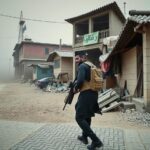Challenges of Conducting Elections During Wartime
Conducting elections during wartime involves numerous challenges, including security risks, voter displacement, and restricted access to polling stations. Historical examples illustrate that very few democracies successfully hold elections amidst conflict without facing legitimacy issues. The postponement of elections is widely endorsed during crises that threaten public safety, emphasizing the need for electoral integrity and trust in democratic processes.
Elections during wartime present numerous challenges, including security threats, voter displacement, and restricted access to polling stations. Additionally, ensuring democratic principles such as political competition and media freedom becomes increasingly difficult. Establishing territorial boundaries and determining eligible voters are essential steps to maintain electoral legitimacy in conflict zones.
Historically, the United States has held elections during various wars, like the Civil War and both World Wars, without significant disruption, apart from Pearl Harbor in 1941. However, these conflicts did not directly jeopardize the nation’s existence. The situation contrasts markedly with elections in countries where active combat occurs, such as Afghanistan and Iraq, where elections faced severe legitimacy issues.
The United Kingdom postponed its general elections during World War II, opting for a wartime coalition government, while general elections in France resumed post-1945 after the conclusion of German occupation. Similarly, Israel has rescheduled elections in response to various military hostilities, particularly in situations where national security was in immediate jeopardy.
In Afghanistan, elections were conducted amid ongoing insurgencies in 2004 and 2009, but violence and intimidation severely impaired their credibility. Iraq experienced similar challenges during its 2005 elections, which were marked by threats from insurgent groups and attacks on polling stations, raising questions about legitimacy.
The Colombian peace process culminated in a 2016 plebiscite aimed at resolving decades of armed conflict. However, the narrow rejection of the peace agreement highlighted societal divisions and led to renegotiations, illustrating the complexities of integrating elections into post-conflict situations.
Legitimate postponement of elections is widely accepted in the face of crises threatening life and security, as recognized by international democratic standards. Legal frameworks often prohibit elections during emergencies, reflecting concerns about electoral integrity and citizen safety.
Elections in wartime face challenges including significant safety risks, voter displacement, limited political freedoms, and external influences. Furthermore, logistical barriers complicate the administration of elections, leading to concerns about legitimacy and credibility when votes are held under such precarious conditions.
Decision-making regarding the timing of elections must be informed by local circumstances and consider the broader context of democratic development. It is crucial to pursue long-term democratic consolidation while ensuring transitional arrangements do not hinder progress.
The international community plays a pivotal role in supporting transitional elections through diplomatic and technical assistance, which can foster sustained democratic processes. In conclusion, while elections are vital to democracy, their successful execution requires secure and conducive conditions. Historical precedents reveal the importance of postponing elections during active conflicts to uphold democratic integrity.
In summary, while elections are essential to democracy, conducting them in times of war presents significant challenges owing to security risks and the potential compromise of electoral integrity. Historical examples underscore that elections held during conflict often suffer from legitimacy issues. Thus, the international community should view the postponement of elections during such crises as a commitment to maintaining democratic values rather than a sign of weakness.
Original Source: www.idea.int





Post Comment